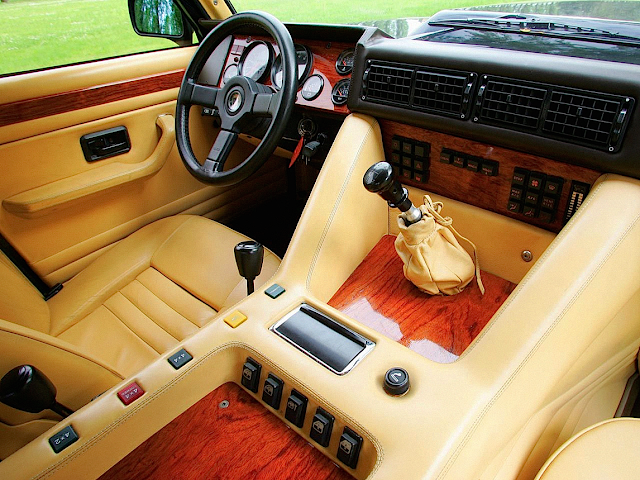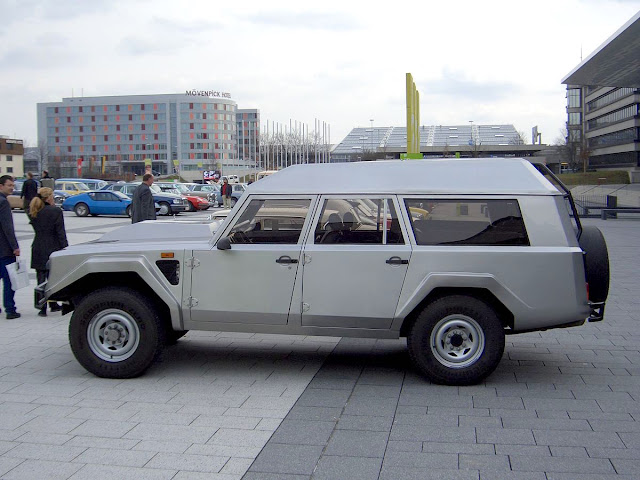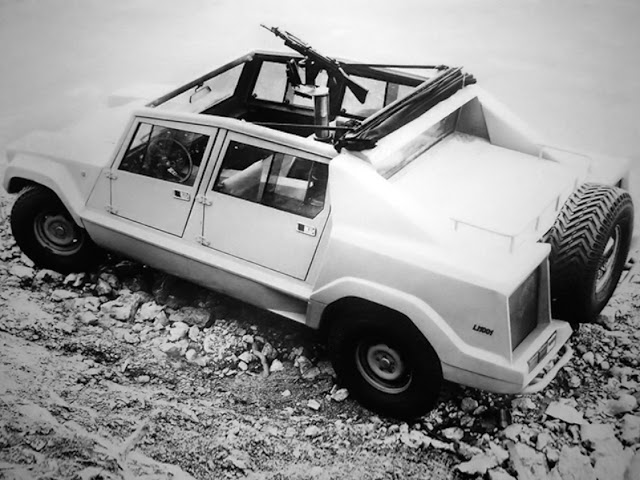The Lamborghini LM002 is an SUV built by the Lamborghini automobile company between 1986 and 1993. The LM002 was an unusual departure for Lamborghini which, at the time, was primarily known for high-performance grand tourers and sports cars. The LM002 is also the first four-wheel drive model manufactured by Lamborghini.
Back in the late 70s the idea came from US army to replace the JEEP by a powerful and modern fully independent suspended 4x4, Lamborghini made a study and built a serial of "LM" prototypes to be tested by US army. The first of which, a 1977 prototype vehicle codenamed the "Cheetah" (photos below), was designed by Lamborghini. However, Lamborghini had to face American’s way of business and patriotism … Hummer got the market with a project actually mostly inspired by the LMs. This led Lamborghini to develop the LM001 Concept (photos below), which was very similar to the Cheetah, but had an AMC V8 engine.
The next prototype, LMA002 in 1986, was built with an entirely new chassis, moving the engine (now the V12 out of the Lamborghini Countach) to the front. After much testing and altering of the prototype, it was finally given a serial number and became the first LM002. The production model was unveiled at the Brussels Auto Show in 1986. It was dubbed the "Rambo-Lambo". Civilian models were outfitted with a full luxury package, including full leather trim, tinted power windows, air conditioning, and a premium stereo mounted in a roof console. In order to meet the vehicle's tire needs, Lamborghini commissioned Pirelli to create the Pirelli Scorpion tires with custom, run-flat tread designs. These were made specifically for the LM and were offered in two different tread designs, one for mixed use and the other for sand use only. These tires could be run virtually flat without risk and could handle the desert heat, the loading, and the speeds of the LM. The LM002 was fitted with a 290 litre fuel tank. The more powerful Lamborghini L804 type 7.2 litre marine V12, more commonly found in Class 1 offshore powerboats, could be specified.
With the 5.2L 4 valves V12 engine from the Countach, the LM002 was a 444hp beast capable of 200km/h among the dunes. Only 301 examples were built which is a kind of success considering the “strangeness” of the concept in the road cars market. The last cars were fitted with fuel injection. (artandrevs.com)
The next prototype, LMA002 in 1986, was built with an entirely new chassis, moving the engine (now the V12 out of the Lamborghini Countach) to the front. After much testing and altering of the prototype, it was finally given a serial number and became the first LM002. The production model was unveiled at the Brussels Auto Show in 1986. It was dubbed the "Rambo-Lambo". Civilian models were outfitted with a full luxury package, including full leather trim, tinted power windows, air conditioning, and a premium stereo mounted in a roof console. In order to meet the vehicle's tire needs, Lamborghini commissioned Pirelli to create the Pirelli Scorpion tires with custom, run-flat tread designs. These were made specifically for the LM and were offered in two different tread designs, one for mixed use and the other for sand use only. These tires could be run virtually flat without risk and could handle the desert heat, the loading, and the speeds of the LM. The LM002 was fitted with a 290 litre fuel tank. The more powerful Lamborghini L804 type 7.2 litre marine V12, more commonly found in Class 1 offshore powerboats, could be specified.
With the 5.2L 4 valves V12 engine from the Countach, the LM002 was a 444hp beast capable of 200km/h among the dunes. Only 301 examples were built which is a kind of success considering the “strangeness” of the concept in the road cars market. The last cars were fitted with fuel injection. (artandrevs.com)
1989 Lamborghini LM002 Estate Conversion by Diomante
In 1989, Turin-based autoshop owner Salvatore Diomante created a one-off "estate" version for the Sultan of Brunei by enclosing the back area and raising the roof. This added significantly to the interior room. (commons.wikimedia.org & wikipedia)
1982 Lamborghini LMA002 Prototype
The LMA002 Concept was built with an entirely new chassis from the 1981 LM001 Concept by moving the engine to the front. The "A" was "Anteriore" because the motor was finally repositioned to the front. Nor was it an American V8, but a legitimate V12 Lamborghini - more precisely, the V12 of 4.75 L used in the Countach LP500S. (wikipedia & flatout.com.br)
1981 Lamborghini LM001 Prototype
The LM001 prototype was presented at the Geneva Motor Show 1981. Its name can mean either "Lamborghini Militaria 001" and "Lamborghini Mimran 001" - depends on the source you consult. What matters is that, although there seemed, was an evolution of the 1997 Cheetah Concept (photos below), keeping even the central-rear engine, this time an AMC of 5.9 liters and 180 hp .... Although weak, the engine was still able to take the LM001 to 160 km/h - something impressive for that time - but the heavy brought back the same dynamic problems of the Cheetah.
The idea was also to create a military vehicle, but not to the US - the target audience of the time were the Middle East, which had already shown interest in the Cheetah. However, to make the LM001 an off-roader viable in the Arab deserts, it was necessary that one engine change of place. (flatout.com.br)
1977 Lamborghini Cheetah Prototype
The original Cheetah prototype had a rear-mounted Chrysler 5.8L V8 engine mounted in the central-rear position, combined with an automatic transmission. The only finished prototype was never tested by the US military, only demonstrated to them by its designer, Rodney Pharis. At the end, Lamborghini had to face American’s way of business and patriotism … Hummer got the market. The Cheetah was a failure and ended up causing great damage to the Lamborghini, contributing to the company's bankruptcy later that 1977. (flatout.com.br & wikipedia)
(Photos from rmauctions.com, artandrevs.com, onlycarsandcars.blogspot.ca,
lambocars.com, autowp.ru, autoblog.com, team-bhp.com, commons.wikimedia.org, flatout.com.br)






































































































































